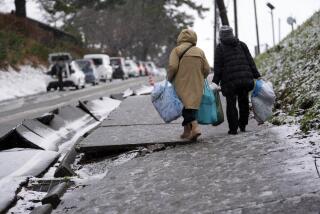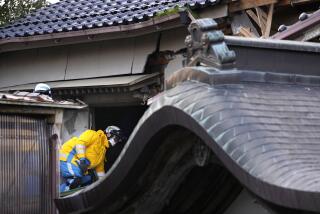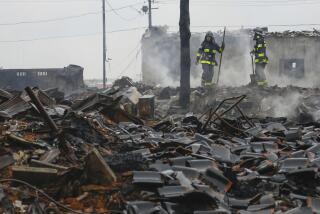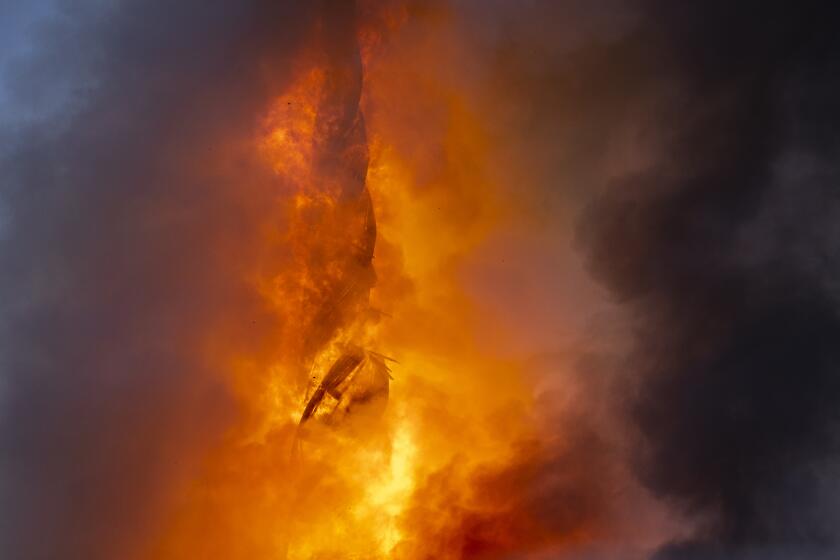Japan nuclear plant workers’ dedication to common good a national trait
In Japan they call them the “Faceless 50.” They are the workers at the ravaged Fukushima nuclear plant who stayed to fight the fires and keep the reactors from melting down.
Watching news reports of the 50 risking everything for the common good, the Japanese see a quiet selflessness, and see themselves.
“We all support them and want them to be successful,” said Shinichi, 34, a banker who gave only his first name as he waited in line to buy gas for company vehicles in Tagajo, about 70 miles north of the battle to save the reactors. “They’re probably the 50 hardest-working people in the world right now. But I’d do the same thing.”
Photos: Crisis continues in Japan
As the Japanese are tested with disasters beyond their imagining, many see the bravery of the Faceless 50 as the epitome of group responsibility, known as Yamato-damashi, or Japanese spirit. That collective consciousness is almost second nature to the Japanese, Shinichi said, especially in times of crisis.
“This is our Yamato spirit,” he said. “We don’t understand where it comes from. But we all have it.”
That self-perception has imbued the response of the Japanese to their dire circumstances, with the ground beneath them shifting or underwater and a nuclear nightmare on the cusp of being realized. It has been seen in the stoicism of life in the rubble, the pride in the apparent lack of looting or egregious price gouging, and the orderly acceptance of the need to ration water and gas.
Time may test that. Authorities have been slow to respond to food and fuel shortages, and the winter weather is miserable. There is widespread grumbling about the broken understanding that the government was ready to handle the aftermath of a severe quake.
But in Tagajo, Hiroko Yamamoto said that although she’s not happy with the government’s response, it is not the Japanese way to make a big fuss, or to focus only on your own troubles.
On Thursday, she stood in the snow in a coat down to her ankles watching a crane remove wave-battered cars from the scarred parking lot of the compressor manufacturing company she works for. And she was staying put.
“As much as I’d love to escape, the group is more important than your own concerns, which follows for most Japanese,” she said.
There’s no power or gasoline in Tagajo, a city of 63,000, and Yamamoto doesn’t know if she’ll get paid before business resumes. But she has volunteered to help her company get back on its feet, which she sees as a way to help the whole country. Days earlier, she’d already called several clients over patchy phone lines.
“Of course it’s our business, but that’s not the main reason,” she said. “These machines will be desperately needed to rebuild the nation.”
They have done it before. The Japanese can point to their history, to the rebuilding of cities after the end of World War II and to their repeated confrontations with nature, traumas that required a coming together in common purpose.
It is not always a benign impulse. When an earthquake and fires scorched Tokyo in 1923, marauding groups of Japanese took out their fury on the city’s ethnic Korean community, a spasm of violence that killed an estimated 6,000 Koreans.
The group-first mentality is nurtured by years of conditioning from parents and teachers, social mores passed along in a society that remains ethnically homogeneous. Some even contend it is a sensitivity bred into the Japanese soul.
This is how we are, they say. This is how we’ll survive.
It was a sentiment on display as Shinji Suda climbed over a pair of smashed cars in Tagajo, squirming around a twisted street light and ratcheting open the hatchback of an upended vehicle to extract a few knickknacks, religious totems and money.
In other countries, he’d probably be mistaken for a looter. But Suda, a garbage collection worker along Japan’s hard-hit northeast coast, said he was on an altruistic mission.
“I’m picking up cash and mementos from my co-workers’ wrecked cars,” said Suda, showing a small plastic akabeko character, a red cow associated with good health. “No one asked me. I just did it to raise their morale a bit.”
To foreigners in Japan, the social discipline is startling.
“If this happened in my country, people would be stealing gas out of each other’s cars,” said a Western diplomat. “It’s amazing. In the West, we have our families and we have the attitude we need to look after them first. Here, the attitude is more about sticking together and trying to get through things.”
You often hear older Japanese complain that the spirit is being diluted, that younger people are more selfish. Teachers and politicians lament this “individuality,” a virus they fear will lead to an atomization of the culture.
“The younger generation is smarter and more clever,” said Katsutoshi Sasaki, 45, a taxi driver in nearby Sendai. “But they have no sense of doing things for others. This could really damage Japanese society.”
Sasaki said he sees signs of that in the response to the nuclear peril: people fleeing the scene to save themselves. Acting on their own.
“It angered me to see those people fleeing because of the nuclear situation before the government advised them,” he said. “What if emergency workers needed fuel and they’ve used it? It really lets the group down.”
That was the solidarity that drove Takashi Makabe as he surveyed his fishing-supply store in Tagajo. The store had no insurance and suffered an estimated $250,000 damage in the disaster. Where the cash register once stood, someone’s white Suzuki Silk Blaze Wagon R had come to rest after smashing through the plate-glass window, hurtling the length of the shop while somehow leaving rows of orange fluorescent squid lures still lined up on hooks.
But Makabe talked about the Faceless 50 at Fukushima. He said he would have been surprised if they hadn’t showed such dedication to their work, even at the risk of their own lives.
“I’m sure I’d do the same thing without thinking,” he said. “If I ran off and others died, I’d never forgive myself.”
More to Read
Start your day right
Sign up for Essential California for news, features and recommendations from the L.A. Times and beyond in your inbox six days a week.
You may occasionally receive promotional content from the Los Angeles Times.






